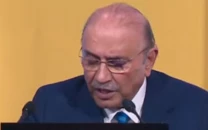The forgotten: Five minutes from capital, miles away from water
Rural areas of Islamabad remain deprived of basic amenities including clean drinking water.

The federal capital can be divided into two contrasting halves. One is the urban half, relatively better off with stable provision of amenities, the other half comprises the rural areas, which are still deprived of these basic necessities.
Boasting of a population of more than 0.8 million, these “less favoured” areas, among other issues, are not being provided with clean drinking water.
The women of these localities are still forced to travel to far off places to fetch water for drinking and other domestic purposes.
Muslim Colony, commonly known as Labour Colony, which is just a few yards away from the presidency, is among the worst off areas. With a population of over 5,000, people have been waiting for a water-scheme for the last 30 years. However, in this locality, not a single scheme of water has been launched so far.
“I have to walk a kilometre to get drinking water. It is a routine matter for us, to travel long distances just to fetch water,” said Jamila Bibi.
Bhara Kahu, which is the biggest Union Coucil of the rural areas, with more than 0.3 million people living in it, “does not even have contaminated water for people to survive on”. There are many areas in the locality including Kot Hatial, Pind Bari, New Mangial, Madani Muhalla where people suffer a lot especially in the summers, when the water level decreases.
A survey of the locality revealed that residents believed they have been ignored ever since Islamabad was declared the federal capital.
“No elected representative ever bothered to pay heed towards our demands. This water issue could have been resolved much earlier if proper steps were taken in timely manner,” said Muhammad Naveed, a local.
Umair Ahmed, another resident of Bhara Kahu, said it was unfortunate that the government never took the issue seriously. “The entire infrastructure has been razed and resources have been utilised for the urban areas only,” he said.
Assistant Director local government, Hassan Abbas, said that government did its best to provide water to these areas. Explaining the ineffectiveness of government’s ‘resolve’ in addressing the water crisis in the rural areas, he said that water level has been decreasing sharply, coupled with the growing population, the issue has been augmented.
Abbas said that many water schemes were completed for the benefit of the people of these areas. However, the locals do not pay their water bills which makes it difficult for us to sustain the supply. However, he said that a mega project was in the pipeline which would be start soon.
Arshad Abbasi, a research associate officer, was of the view that almost 60 per cent of water in Islamabad was wasted due to leakage in the system. He said if damaged pipeline were repaired half of the problem could be solved.
He suggested that proper mechanism with long term policy should be adopted in order to over come the water issue.
Published in The Express Tribune, April 18th, 2011.



















COMMENTS
Comments are moderated and generally will be posted if they are on-topic and not abusive.
For more information, please see our Comments FAQ